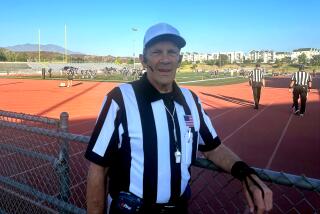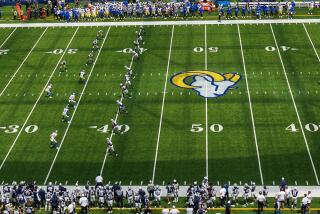TECHNICALS : The Threat of the Call Is Enough to Keep Most Coaches in Line, but Others Know Just When to Stop From Crossing Over
When North Carolina State basketball Coach Jim Valvano fainted during the Wolf Pack’s upset of the University of Nevada Las Vegas last month, he had one major concern.
Missing a crucial play? Hitting his head on the bench?
Hardly.
“I was worried about landing outside the coaching box and getting a technical,” he told Sport Illustrated.
Technical fouls. They are basketball’s answer to Amy Vanderbilt, governing a wide spectrum of etiquette on the court.
The domain of the technical foul, which allows an opponent to shoot one or two free throws, is any infraction of the rules outside of the normal flow of play.
For players, that covers all sorts of mental and moral failings--everything from spiking the ball to hanging on the rim to taunting an opponent.
Some technicals are considered “bench” fouls. They are charged against the coach and yield a two-shot penalty.
Those include allowing a player to enter the game without reporting to the scorer, using two players with the same number or inciting undesirable crowd reaction.
Spectators often do not witness some technicals.
When was the last time you saw a coach use a megaphone or a TV monitor during the game? How about accidentally sitting down on the wrong team’s bench? These obscure infractions are punishable by a technical.
But like gravity, technicals don’t have to be seen to exert an influence.
Most commonly, the threat of technicals is the invisible force that holds players’ and coaches’ mouths closed when circumstances might otherwise provoke an outburst.
Of course, if somebody gets angry enough, the specter of allowing a couple points isn’t going to provide a big deterrent.
There was the incident last season when Indiana Coach Bobby Knight hurled a chair across the court during a loss to Purdue.
But technicals operate on a philosophy similar to that of the strike count in baseball--when you accumulate three, you’re out. On the third technical, coaches are automatically ejected.
Short of rearranging the furniture, sometimes a simple gesture can draw a technical, if it’s symbolic enough.
Espiridion (Speedy) Castillo, the instructional supervisor of the Orange County Officials Assn., explained.
“For example, if a coach says, ‘Hey Speed,’ and then puts his hands to his throat, that means, ‘You choked’ and it’s a technical,” he said.
Another action by a coach that almost invariably results in a technical is stepping onto the court, a taboo.
Steve Scoggin, University High School coach, learned that by example years ago.
“I remember when I was in high school playing for Victor Valley, and our coach got overly excited after a play,” Scoggin said. “The next thing you know, he was way out on the court.
“The ref stopped the game and told him that for every step it took him to get off the court, he was going to get a T. He called two of our biggest guys off the bench and told them to carry him off the court. He only got one T.”
Nor does it pay to get familiar with the officials, even if you are.
Foothill Coach Jim Reames recalled: “One time two years ago against Villa Park, a guy I’ve known for years named Jim Dokes was refereeing.
“We were playing Newport Harbor in the San Clemente tournament final. We were pressing and I thought we had them for a 10-second call. I got off bench and yelled, ‘Jim, that’s 10 seconds!’ And he goes, ‘T’, and I go, ‘T? What did you T me for?’
“And he said, ‘Don’t call me by my first name.’ I always remember that because I could not believe he called it. I didn’t swear or anything.”
Then there are the technicals that almost seem petty, but are necessary to retain the integrity of the rules, as well as the safety and fairness of the game. An example is dunking the ball during warm-ups.
Once, a team held a 5-0 advantage before a game at Marina High School ever started. The team had been given five pre-game free throws on technicals, recalled official Larry Arason.
The cause? The other team’s uniform numbers didn’t match the starting lineup submitted to the officials 10 minutes before game time.
On occasion, a shrewd coach will make a calculated effort to draw a technical, either in the hope of inspiring his team or as a protest against the officials’ performance.
In conversations on the subject with Orange County coaches, one name tends to be mentioned again and again.
Tom Danley, whose Katella teams have gone to the playoffs for the last 19 years, has turned officials’ manipulation into an art form, the coaches say.
Fountain Valley Coach Dave Brown: “(Tom) Danley’s a pro at it.”
Loara Coach Craig Conrad: “Danley’s the legend.”
Danley admits: “On rare occasions, I’ll draw a technical, I won’t lie to you. I’ve used that device.
” . . . As far as getting a technical for a technical’s sake, it’s like a traffic ticket. If you run a red light, you risk being cited.”
Danley is careful to preface his comments by saying that Orange County’s officials are more qualified and competent than those from most other areas.
But he says that “a rare 5% of the time, you don’t get an equitable performance (from an official).”
It’s on those occasions that Danley, armed with his distinctive nasal voice, swings into action.
The goal is to change the climate of the game. That means: Head off trends in the officials’ calls that seem unfavorable to the Knights.
How does a coach accomplish that? Danley proceeds with definite techniques, as ritualized as a rain dance. When he resorts to them, which he says isn’t that often, he says they affect favorable changes 60% to 70% of the time.
“You don’t say four-letter words,” he explained. “You say something like, ‘How about calling the same game at both ends?’ as he walks by, or ‘I’d like to play against five, not six, tonight.”
“All you have done is questioned whether he’s being fair. The good official will keep right on going.”
The other kind? “He’s already completely flustered and out of his game.”
“I know how to catch their ear. The way you can tell is, the next thing he’ll do is plant himself in front of you, waiting for you to make another comment.
“If you want the T, that’s ideal.”
Danley emphasizes that only in rare circumstances does he think there is a need to manufacture a technical. He believes the method creates pressure on the official by focusing the attention of a gym full of spectators on the issue.
“If I feel an official is being overbearing to the point of negating our performance, deliberately trying to take our game away, I will protest to draw attention to him,” he said. “He thinks he’s putting you on the spot, but you’re putting him on the spot.
“If it makes a dramatic change in the way the game’s being officiated, you feel you’ve accomplished something.
“If not, what have you lost? Except you’ve given the other team the opportunity for a couple of points.”
DR, MATT WUERKER / For The Times
More to Read
Go beyond the scoreboard
Get the latest on L.A.'s teams in the daily Sports Report newsletter.
You may occasionally receive promotional content from the Los Angeles Times.










